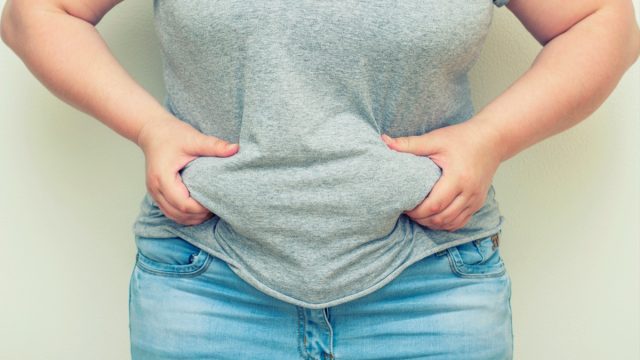
Belly fat can be more than uncomfortable and make your clothes a bit tighter, and it can be harmful. Catherine Johnston, a registered dietitian and certified personal trainer, explains, “Abdominal fat’s more dangerous form is called ‘visceral fat.’ This is the fat that can surround the organs and can cause inflammation, which often contributes to chronic diseases including diabetes and heart disease.” While losing abdominal fat can be a challenge, with dedication and a few lifestyle changes, it can happen. Read the five tips below to see how to reduce your waistline.

Johnston says, “Both high intensity interval training (HIIT) and moderate intensity cardio workouts longer than 45 minutes were shown in a 2017 comparative study to help reduce abdominal fat mass, but HIIT shows greater long-term promise due to its time-efficient factor and a beginner HIIT workout can fit easily into a new routine. Try starting with a 5-10 minute routine and increase time or intensity as you feel ready! Don’t worry though — HIIT is only recommended 2-3 days per week so you can still have time to enjoy your other favorite ways to move.”

Johnston explains, “lean protein, healthy fat and fiber are the ‘big three’ for satiety. Including these at your meals, and at least 1-2 of them at your snacks, can prevent snacking throughout the day on higher-calorie low-nutrient options (vending machine snacks, anyone?). Less high-calorie snacking means less overall calories which can be a factor in less fat storage, including in your abdomen.”

According to Johnston, “Stress can have a two-fold impact on abdominal fat gain. First – unmanaged stress can lead to emotional or stress eating, which for most of us tends to be high-calorie, low nutrient comfort foods. Secondly, chronic stress can increase levels of a hormone called cortisol which may contribute to central fat distribution in some people. Adding intentional stress reducing practices, such as meditation, journaling or your favorite hobbies can help reduce the effects of stress.”

“Just like stress, inadequate sleep can be double trouble for abdominal fat gain,” Johnston states. “Getting less than the recommended 7-9 hours per night can lead to daytime high-calorie food cravings, especially carbohydrates which can help wake us up with quick energy. Additionally, chronic poor sleep quality or quantity can increase cortisol levels. Try tracking your sleep and making small adjustments to your routine to get more time in bed. Additionally – a fitness tracker can help determine your sleep quality, and help you decide if you need to get your doctor onboard with a treatment plan.”
RELATED: 90% of People Who Die From COVID Have This in Common

Johnston says, “Aim to keep added sugar to a minimum most days. The American Heart Association recommends <24g per day for women and <36g per day for men. High-sugar foods and beverages, especially sugar-sweetened beverages like soda, have been found to be correlated with an increase in visceral fat and waist circumference.”














